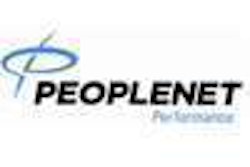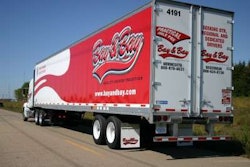The Federal Maritime Commission has decided to allow the Port of Los Angeles and the Port of Long Beach to begin collecting fees from port operators under the PortCheck Agreement of the ports’ joint Clean Truck Program (CTP) after meeting and discussing anticompetitive concerns associated with the CTP.
FMC currently is pursuing an injunction under section 6 of the Shipping Act against certain aspects of the CTP in the U.S. District Court for the District of Columbia. The PortCheck Agreement, as one part of a related web of agreements, implements the harmonized CTP, which FMC has determined is likely, by a reduction in competition, to result in an unreasonable reduction in transportation services and an unreasonable increase in transportation cost. FMC said Wednesday, Feb. 11, that in light of the previously filed action targeting the most anticompetitive provisions of the CTP, it determined that it is unnecessary to separately enjoin operation of the PortCheck Agreement and fee collection.
FMC said Wednesday it also determined to require the parties to the PortCheck Agreement to file special monitoring reports with FMC, which would allow the commission to closely monitor the ongoing operation of the CTP collection process to assess the fee’s impact on the San Pedro Bay drayage industry, and the American shippers and consumers served by that industry.
The Port of Los Angeles had announced Jan. 22 that it would begin collecting fees for its CTP on Feb. 18, simultaneously with the Port of Long Beach. The fee is expected to raise funds over the next few years at both ports to help finance the replacement of thousands of old higher-polluting trucks currently in drayage service.
The CTP is part of a massive five-year Clean Air Action Plan to reduce port truck emissions at the San Pedro Bay ports by 80 percent and emissions from all sources by 45 percent. Collection of the Clean Trucks Fee was scheduled to begin in November, but was delayed twice due to extended FMC review.
“It’s imperative that we start the program and continue the progress we have made to date in terms of banning pre-1989 trucks and accelerating the deployment of more than 2,200 2007-compliant trucks through our 2007-Compliant Incentive Program,” says Geraldine Knatz, Port of Los Angeles executive director.
Through that program, more than 100 of the Port of Los Angeles CTP concessionaires applied to receive $20,000 for each U.S. Environmental Protection Agency-compliant truck serving port cargo terminals, according to the port; more than 100 local Licensed Motor Carriers applied for the incentives in order to operate clean trucks and be exempt from the Clean Trucks Fee.
Beginning Oct. 1, 2008, the port banned the most polluting trucks — 1988 and older vehicles — the initial ban in a series planned under the CTP. On Jan. 1, 2010, the port will ban 1993 and older trucks, and unretrofitted model year 1994 to 2003 trucks. By January 2012, all vehicles 2006 and older will be banned.
The West Coast Marine Terminal Operator Agreement created the not-for-profit company PortCheck to collect the Clean Trucks Fee for the ports. The money collected will be transferred to the ports to provide financial assistance for the replacement of thousands of trucks during the next three years. Under the program, the cargo owner is responsible for paying the Clean Trucks Fee, which must be paid before a container can enter or leave a terminal.
In November, the ports filed with FMC their PortCheck agreement with marine terminal operators, who would develop and operate an online and electronic gate access system to collect the ports’ $35 per 20-foot-container-unit Clean Trucks Fee. After the PortCheck agreement was filed with FMC, the commission reclassified the agreement that should have taken effect upon filing, as subject to 45-day review, according to the ports.
On the 45th day, FMC then issued a request for additional information and ordered a second 45-day review period, which concluded Friday, Feb. 13. FMC also had filed its lawsuit to block portions of the CTP as anti-competitive. U.S. District Court Judge Richard J. Leon said he would not rule on FMC’s request for a preliminary injunction until sometime in 2009. Also pending Judge Leon’s decision is the ports’ motion to dismiss FMC’s complaint.
The American Trucking Associations on Dec. 19 filed its reply brief in the Ninth Circuit Court of Appeals in its effort to secure an injunction against the enforcement of the ports’ concession plans. ATA’s litigation focuses on the ports’ requirement to force carriers to sign concessionaire agreements with the ports; the association argues that the concessions would impose a broad range of operational requirements that recreate a regulatory environment comparable to state intrastate economic regulation, which is federally preempted. ATA also says it is especially troubled by the Port of Los Angeles’ plan to ban independent contractors within five years.
FMC on Jan. 22 denied the ports’ request for a stay of the commission’s investigation, ruling that opposing petitioners in the CTP can intervene. Administrative Law Judge Clay Guthridge ruled ATA, the Owner-Operator Independent Drivers Association and National Association of Waterfront Employers have permission to intervene, along with the Sierra Club, Natural Resources Defense Council and Coalition for Clean Air. Guthridge also denied the ports’ request to halt the commission’s investigation until it had issued an environmental impact report regarding its action.












